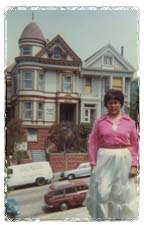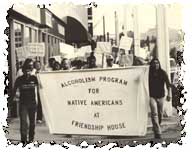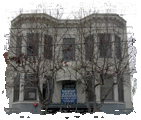A Lifetime of Service
 1963
1963
The Christian Reform Church establishes the Friendship House,
a multi-service drop-in social service agency as a safe
haven for the growing urban Indian community in San Francisco.
Helen Waukazoo is a co-founder and takes her first job here
as a clerk-typist.
1973
The American Indian community organizes itself and assumes
control of the drop-in agency, incorporating as a 501©(3)
non-profit named Friendship House Association of American
Indians, Inc., of San Francisco. Helen Waukazoo is promoted
to bookkeeper. 
1981
Friendship House successfully organizes the Indian community
to demand support from the City and County of San Francisco
for program services - the first time the City has supported
the organization since it was created.
1982
Friendship House moves
from its Octavia Street location to a former duplex
at 80 Julian Avenue in the  Mission
District. Helen Waukazoo is promoted to fiscal manager.
Mission
District. Helen Waukazoo is promoted to fiscal manager.
1987
The Friendship House board of directors considers purchasing
80 Julian Avenue but a vote to buy fails by a slim margin.
Helen Waukazoo is promoted to executive director.
 1996
1996
Friendship House is recognized for excellence by the Indian
Health Service for the third year in a row. The Friendship
House board of directors unanimously approves a resolution
to search for a suitable site and financing for a new building.
Friendship House obtains its first City funding to determine
the project feasibility. A consultant is hired to manage
the building project. Friendship House begins operating
a pilot Job Readiness Support Project.
1997
The agency expands the number of beds at 80 Julian by 50%
- from 20 beds to 30 beds, and leases an additional site
for administrative offices. The agency budget tops $1 million
for the first time. Friendship House begins a five-year
Women's Health Demonstration Project.
 1998
1998
Friendship House wins the Indian Health Service contract
to expand services in Santa Clara County and provide up
to 7 residential beds for Indians in the South Bay.
 1999
1999
Friendship House obtains a commitment of financing from
the City and County of San Francisco to acquire a site on
which to build a new, four-story, 26,000-square-foot building
which will house 80 beds - almost triple the number of beds
available for residential treatment. Friendship House opens
escrow on 50 - 68 Julian Avenue.
2000
Additional support for the building project construction
costs is identified from various government sources. Friendship
House closes escrow on 50 - 68 Julian Avenue. Friendship
House launches the Circle of Friends Capital Campaign. Friendship
House begins operating a Youth Services and Leadership Development
Program. The agency budget tops $2 million for the first
time.
2001
Friendship House wins the Indian Health Service contract
to expand services in Alameda County and provide residential
treatment for women and their children. Friendship House
becomes a regional treatment center for the entire Bay Area.
Friendship House receives new, five-year federal funding
to expand treatment and prevention services. The agency
budget tops $3 million for the first time.

![]()
